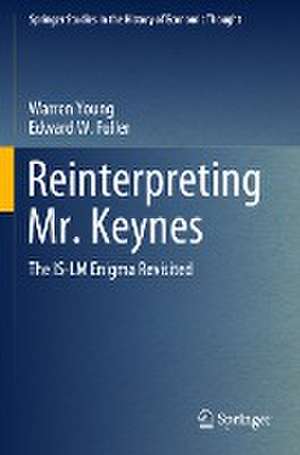Reinterpreting Mr. Keynes: The IS-LM Enigma Revisited: Springer Studies in the History of Economic Thought
Autor Warren Young, Edward W. Fulleren Limba Engleză Paperback – 21 ian 2023
| Toate formatele și edițiile | Preț | Express |
|---|---|---|
| Paperback (1) | 577.87 lei 6-8 săpt. | |
| Springer International Publishing – 21 ian 2023 | 577.87 lei 6-8 săpt. | |
| Hardback (1) | 583.93 lei 6-8 săpt. | |
| Springer International Publishing – 20 ian 2022 | 583.93 lei 6-8 săpt. |
Preț: 577.87 lei
Preț vechi: 679.84 lei
-15% Nou
Puncte Express: 867
Preț estimativ în valută:
110.59€ • 114.80$ • 92.21£
110.59€ • 114.80$ • 92.21£
Carte tipărită la comandă
Livrare economică 22 martie-05 aprilie
Preluare comenzi: 021 569.72.76
Specificații
ISBN-13: 9783030913441
ISBN-10: 3030913449
Pagini: 161
Ilustrații: X, 161 p. 20 illus., 4 illus. in color.
Dimensiuni: 155 x 235 mm
Greutate: 0.25 kg
Ediția:1st ed. 2022
Editura: Springer International Publishing
Colecția Springer
Seria Springer Studies in the History of Economic Thought
Locul publicării:Cham, Switzerland
ISBN-10: 3030913449
Pagini: 161
Ilustrații: X, 161 p. 20 illus., 4 illus. in color.
Dimensiuni: 155 x 235 mm
Greutate: 0.25 kg
Ediția:1st ed. 2022
Editura: Springer International Publishing
Colecția Springer
Seria Springer Studies in the History of Economic Thought
Locul publicării:Cham, Switzerland
Cuprins
Introduction, Keynes’s Own IS-LM Approach.- Prologue to Keynes’s IS-LM, 1930 to 1932.- The Advent of Keynes’s IS-LM, 1933.- “The Missing Link”: Keynes’s Own Lecture Notes, December 4, 1933, Impact and Implications.- Reconstructing Keynes’s IS-LM Approach, 1931 to 1937.- Keynes’s Equations and Early Post-General Theory IS-LM Models.- The Legacy of December 1933: Re-Interpreting Mr Keynes.
Notă biografică
Warren Young is a Professor Emeritus, Economics, Bar Ilan University, Israel. He is the author and editor of 14 books and over 70 academic papers. He is the author of "Interpreting Mr Keynes: the IS-LM Enigma" (Polity and Westview, 1987). He was a visiting scholar at Carnegie-Mellon University and former adviser, Archives Project, Federal Reserve Bank of Minneapolis.
Edward W. Fuller is an independent researcher in economics. He is editor of "A Source Book on Early Monetary Thought", "Mises A to Z", and "Rothbard A to Z". He has published articles in a wide variety of journals, including Cambridge Journal of Economics, Quarterly Journal of Austrian Economics, and Review of Austrian Economics.
Edward W. Fuller is an independent researcher in economics. He is editor of "A Source Book on Early Monetary Thought", "Mises A to Z", and "Rothbard A to Z". He has published articles in a wide variety of journals, including Cambridge Journal of Economics, Quarterly Journal of Austrian Economics, and Review of Austrian Economics.
Textul de pe ultima copertă
This book examines the origins of the IS-LM model, one of the most significant innovations in the history of economic thought. It shows that the complete IS-LM model, including the equations and diagram, was produced by a group of economists who contributed their respective mathematical models of Keynes’s General Theory, including Champernowne, Reddaway, Harrod, and Meade, not to mention Hicks. Furthermore, the book discusses the implications of newly discovered archival material, including a previously overlooked document showing that John Maynard Keynes himself was the first to present the IS-LM model equations in a lecture he gave on December 4, 1933. It focuses on the implications of this material in terms of understanding the evolution of Keynes’s approach from 1933 to 1937, later interpreters of his General Theory, and the ongoing debate between Keynesians and Post-Keynesians on the nature of his system. Given the revelations it presents, this book will transform the profession’sunderstanding of the origins of the IS-LM model and modern macroeconomics.
Caracteristici
Investigates the origins of the IS-LM model Discusses the implications of newly discovered archival material on and from John Maynard Keynes Provides a better understanding of the evolution of Keynes’s approach from 1933 to 1937










